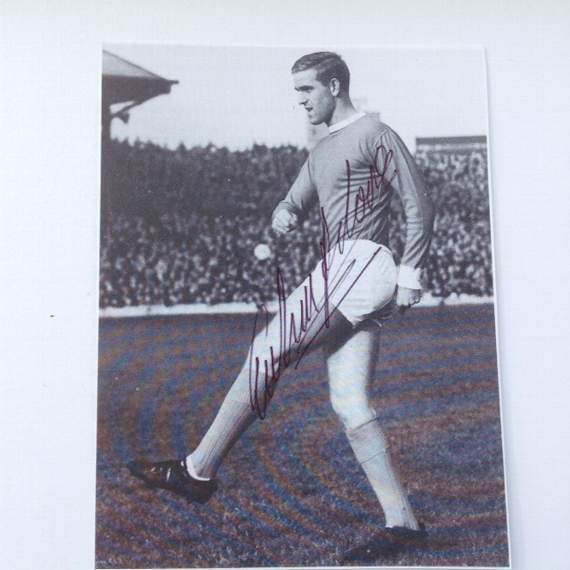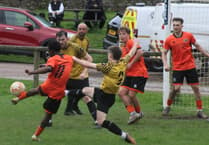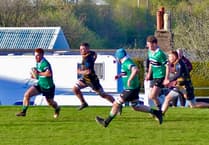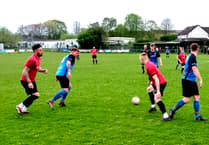A LLANELLEN man who won 21 caps for Wales, and was considered the Gareth Bale of his day was honored by two of his old teams when Cardiff City and Charlton Athletic held a minute’s silence prior to their 0-0 draw last Saturday.
Graham Moore who recently passed away at the age of 74 wrote himself into Bluebirds’ folklore when he netted Cardiff’s winner against Aston Villa in April 1960 - a goal which saw the club promoted to the top flight of the English game, eight points above third-placed Liverpool.
Not long after Chelsea came calling, and the talented youngster from Hengoed signed for £35,000, a club record fee for the Bluebirds at the time.
After helping the Stamford Bridge outfit gain promotion to the old Division One, Moore moved to Old Trafford and played for Manchester United under Sir Matt Busby, before serving stints with Northampton Town, Charlton Athletic and finally Doncaster Rovers.
Moore, who worked during his teenage years at the Penallta Colliery in the Rhymney Valley along-side his father and brother, was spotted by Cardiff whilst playing for Bargoed YMCA, in 1956.
Moore made 85 league appearances for the Bluebirds, and netted 23 goals. He made his debut for the club at just 17, scoring a last-minute equaliser in a 2–2 draw with Brighton in September 1958.
In October 1959, Moore announced his arrival on the international stage with a late equalizer in Wales’ 1-1 draw against England in front of a Ninian Park crowd of 62,000.
The attacking midfielder who was renowned for his ability to glide past opponents went on to win 21 caps for Wales, and was named 1959’s Welsh Sports Personality of the Year.
After retiring from football in 1974, Moore and his wife Rita run a pub in South Yorkshire called the Bay Horse, before returning to Wales in 2013 to be closer to family and friends, and settling happily in Llanellen.
Mrs Moore, who was married to Graham for 54 years, told the Chronicle, “As a family we have been overwhelmed with the all the tributes to Graham, both as a player and as a man, it was not something we expected at all, there have even been articles in both Spanish and French newspapers, (he would have been so surprised and thrilled).
“Graham was a very modest man and not want to blow his own trumpet, and in later years a lot of people never realised what he had done with his life in terms of football, such as playing against Pele in South America in front of a crowd of 60,000. (Wales friendly against Brazil, May 16, 1962 at Estádio do Morumbi, São Paulo.)”
Mrs Moore added, “Pardon the pun, but it was a different ball-game when Graham started. He was on £17 a week, we lived in a small semi and he a drove a Ford Cortina. The players were definitely not looked after in the same way they are now and the game was a lot more brutal. Graham was forever plagued by injuries. He broke his leg three times and had to have a disc in his back removed.”
Mrs Moore explained, “The club owned the players and to a degree treated them like racehorses. For example if Graham was injured in a crucial match, they’d take him off, inject him with goodness knows what and send him straight back into the fray.
“In latter years it took its toll on his body. He had to have two new hips, a new knee and he couldn’t stand or walk for a long time. His footballing friends all had similar problems.
“Having said that. He had no regrets and loved the game up until the end. He had very strong thoughts on the way football had gone, but he remained a keen fan, and out of all his former clubs he always had a soft spot for Charlton.”
Mrs Moore said, “It was always surprising to me, to see how the friendships Graham forged during his playing days remained rock solid 30, 40, and 50 years later.
“The amount of players who visited Graham was incredible, and more than just a player, he was popular as a man.
Reflecting on Saturday’s match, Mrs Moore said, “The whole family were invited to the match between Charlton and Cardiff, where we were regally treated. All the players wore black armbands for the match and it wonderful when the crowd paid tribute with a minute’s applause. We were incredibly proud of the respect and love shown to him.”
Graham Moore (March 7, 1941 - February 9, 2016) is survived by his wife, three children, and seven grandchildren.





Comments
This article has no comments yet. Be the first to leave a comment.